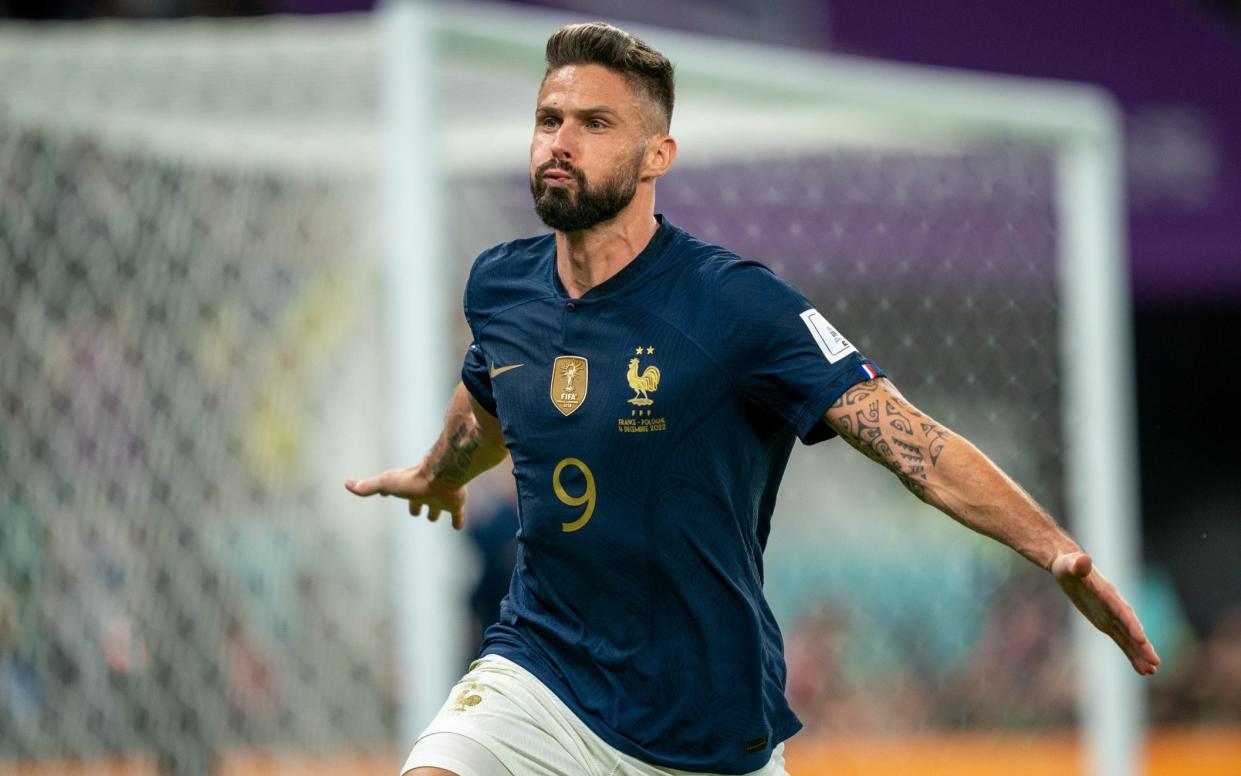England should fear Olivier Giroud because crosses will win this World Cup

- Oops!Something went wrong.Please try again later.
- Oops!Something went wrong.Please try again later.
What is the secret to success at this World Cup? As it turns out, the answer is quite simple: sticking it in the mixer. Crossing is emphatically back in fashion, and the experts believe it could determine which team ultimately lifts the trophy in the Lusail Stadium on December 18.
In this case, the expert in question is Arsene Wenger. The former Arsenal manager is now Fifa’s chief of global football development and his team in Qatar has been studying the tactical trends of the World Cup so far.
The most eye-catching conclusion they have drawn is that goals from open-play crosses are up by an enormous 83 per cent compared to the 2018 World Cup in Russia. The “open play” definition means that crosses from free-kicks and corners do not count towards this total.
Fifa’s Technical Study Group (TSG), which Wenger leads, has so far only analysed the group stages of this tournament, so their figures do not take into account the first few knockout matches.
But the figures are so striking, and the increase so dramatic, that it is clear that a pattern has developed. For England, preparing to face France and their target man Olivier Giroud this weekend, this research should serve as a warning: against Australia, France scored three goals from crosses in one game.
England are also dangerous from these situations, having struck three goals from open-play crosses in their three group matches (Jude Bellingham and Raheem Sterling against Iran, Phil Foden against Wales). They did so again, through Bukayo Saka, against Senegal. But Giroud is a more obvious aerial threat than Harry Kane, who has operated in a withdrawn role for much of the tournament, and he must be watched carefully when the ball goes wide.
A special moment for Olivier Giroud 🤩
He becomes France's joint-highest top scorer, alongside Thierry Henry ⚽🔝
🇫🇷 4-1 🇦🇺
💻🖥📱 Watch on @BBCiPlayer, listen on @BBCSounds, get more on the @BBCSport app#BBCWorldCup #BBCFootball pic.twitter.com/r5fvBerNCR— BBC Sport (@BBCSport) November 22, 2022
The main reason for the surge in goals from crosses, in Wenger’s eyes, is that defending teams are deliberately blocking the central areas. As a general rule, defenders and midfielders are so fearful of opponents playing through the middle of the pitch that they are forming compact blocks inside the width of their own area. In the search for space, attacking teams are exploiting the areas out wide.
Jurgen Klinsmann, the former Germany striker and a member of the TSG, said: “In general, we are seeing a trend that the compactness of teams in a defensive block, in the defensive shape, is so focused on the middle area [of the pitch] that it is really, really difficult for teams to break through the middle, and also to get shots at goal from 20 to 25 yards.
“We have seen, at previous World Cups, a lot more of these shots than at this one. It is very difficult at this World Cup because the defensive line and the midfield line are so close together. There is almost no chance to pull the trigger.”
'The team with the best wide players will win the tournament'
The more successful attacking teams have been eager to use the full width of the pitch, then, and they have also been quick to deliver the ball into the penalty box. “They are not shy about playing crosses early and making the runs early,” said Klinsmann.
The willingness to cross the ball means that players have been dribbling less frequently than in previous tournaments. Compared to other World Cups, wingers have been far more interested in whipping the ball into the box than running at their full-back in a one-versus-one situation. In the group stages, the number of “take-ons” was down by 33 per cent.
For Wenger, all of this analysis leads to one conclusion: the wide players are the most important players at this World Cup. As such, the team with the most effective wingers is, he believes, the most likely to go all the way in Doha.
“The main information we have got from all of these numbers is that the centre of the pitch is protected, and the importance of wide players,” said Wenger. “I personally think the team with the best wide players will win this tournament.”
France pose the toughest of tests in this regard. If England leave space in the middle of their defence, Kylian Mbappe and Ousmane Dembele will dart inside from the wings. But if they instead pack the central areas, those two wingers have space to play crosses for Giroud. It is a perilous tightrope, and one that Gareth Southgate’s side must tread carefully.

